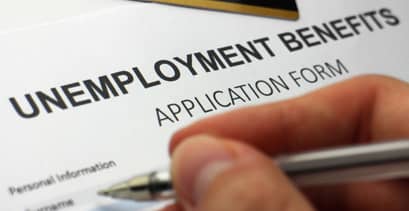Your Rights Related to Unemployment Compensation
Eligibility for Unemployment Benefits
 Losing your job can be devastating and can catch you by surprise. Companies move, get sold, or shut down. Fortunately, when you find yourself out of work through no fault of your own, you can get unemployment compensation. It’s not the same as a new job, but it can often get you through until your fortunes change.
Losing your job can be devastating and can catch you by surprise. Companies move, get sold, or shut down. Fortunately, when you find yourself out of work through no fault of your own, you can get unemployment compensation. It’s not the same as a new job, but it can often get you through until your fortunes change.
What Is Unemployment Compensation?
Unemployment compensation, commonly referred to as “unemployment,” or alternatively as “unemployment insurance,” is a government benefit available to individuals throughout the country who are involuntarily unemployed. Benefits are limited to persons who were not terminated because of wrongful conduct. The benefits are calculated based on your wages before termination, though there are minimum and maximum payments under the law. The benefits are generally available for a fixed period of time, or until you find employment, whichever comes first.
The Origins and History of Unemployment Compensation
Though unemployment laws were proposed as early as 1916, workers in the United States were first eligible for unemployment benefits during the Great Depression, when the United States Congress enacted the Social Security Act of 1935. A number of states offered such benefits before the federal government, with Wisconsin passing the first unemployment compensation law in 1932. The Social Security Act does not create a federal unemployment compensation benefit, however, but makes it easier for states to administer their own programs. The program is funded by taxes collected at the federal level, which are then distributed to the states.
Eligibility for Unemployment Compensation
Eligibility for unemployment compensation is governed by state laws and can vary in some ways. As a general rule, though, there are certain minimum requirements to qualify for payments:
- The recipient must be a United States citizen.
- The recipient must meet state eligibility requirements related to either wages or length of time employed during a certain period.
- The termination of employment must not be for “cause,” i.e., based on wrongful actions or misconduct of the employee. As a general rule, the misconduct must be significant. Minor infractions typically do not disqualify someone from receiving unemployment.
- The termination must be involuntary, unless the employee can show that they would suffer injury if they continued to work, or that their employer made conditions so intolerable that they felt compelled to quit. That may include discrimination or harassment in the workplace, retaliatory conduct by the employer, unsafe conditions in the workplace, or persistent threats of termination.
- Most states require recipients to be actively seeking employment.
How to File for Unemployment Compensation
Each state has an agency that administers unemployment benefits programs for workers. To pursue unemployment compensation, you must file an application with the appropriate agency. When you do, your former employer will be notified and will have an opportunity to dispute your claim. The unemployment agency may then approve or reject your claim. Both you and your employer have the right to contest the ruling of the state administrative agency.
Minimums and Maximums
As a general rule, workers are entitled to unemployment benefits for up to 26 weeks. Typically, the amount of the weekly benefit is calculated by taking 1/26th of the weekly average of wages actually earned during some recent period. Some states take the two most recent quarters, whereas others will go further back in time, and take the highest wage base. In all states, there are minimum and maximum payouts. Currently, the highest payouts are in Massachusetts, where workers can collect more than $800 per week. Mississippi offers the lowest benefits payouts, just over $230 per week. Montana offers the longest period of unemployment, at 28 weeks, whereas Florida only provides benefits for 12 weeks.
COVID-Related Unemployment Programs
In response to the COVID-19 pandemic, Congress enacted the CARES Act, which included a number of provisions related to the availability of unemployment benefits:
- The act allowed states to extend unemployment benefits for an additional 13 weeks
- The act provided an additional $600 in weekly benefits to anyone receiving unemployment compensation
Most of the additional unemployment benefits provided by Congress because of the pandemic have expired. To learn if you are still eligible for special benefits, you should contact your state’s unemployment compensation agency.
Summary
Unemployment compensation provides a temporary safety net to workers who are involuntarily terminated for reasons other than their own misconduct or wrongful acts. The programs, while funded by the federal government, are administered at the state level. To obtain benefits, you must file an application with your state’s unemployment compensation agency. The decisions of the agency may be appealed, by you or your employer.
Connect with Top-rated Attorneys Near You
Sponsored Advertisement
Other Employment Law Topics
Protecting Yourself (or Your Employees) from Workplace Discrimination
Americans with Disabilities Act
How Does Collective Bargaining Work?
Common Discrimination Claims
Definitions and Sources
Employer and Employee Responsibilities
Equal Employment Opportunity Commission
Your Rights Under the Family and Medical Leave Act
Federal and State FMLA Laws
Your Rights During the Hiring Process
Hiring Resources and Definitions
Hiring Teenagers, Veterans, and Part Time Workers
Information for Employers
Job Termination and Wrongful Discharge
Federal Labor Law and Worker Organizations—An Overview
The Regulation of Minimum Wages in the United States
Other Employment Law Topics
Other Types of Discrimination
Sexual Harassment in the Workplace
Laws Protecting Pension and Retirement Plans
Workers’ Compensation and the Law
The Laws Governing Workplace Safety
Latest Article
What Is a Right-to-Work State?
What Protections Does a Worker Have in a Right-to-Work State? Is It the Same as Employment-at-Will? Have you ever heard... Read More
Collective Bargaining in Employment Matters
Its Benefits and Why Some Corporations Try to Prevent It In our work, most of us look for something that rewards our ef... Read More
Who Benefits Most from Workplace Safety Regulations?
Do Workplace Safety Measures Protect Workers or Benefit Employers? According to the Bureau of Labor Statistics, nearly ... Read More
GETLEGAL®ATTORNEY DIRECTORY
Find Leading Attorneys in Your Area
NEED PROFESSIONAL HELP?
Talk to an Attorney
How It Works
- Briefly tell us about your case
- Provide your contact information
- Choose attorneys to contact you





